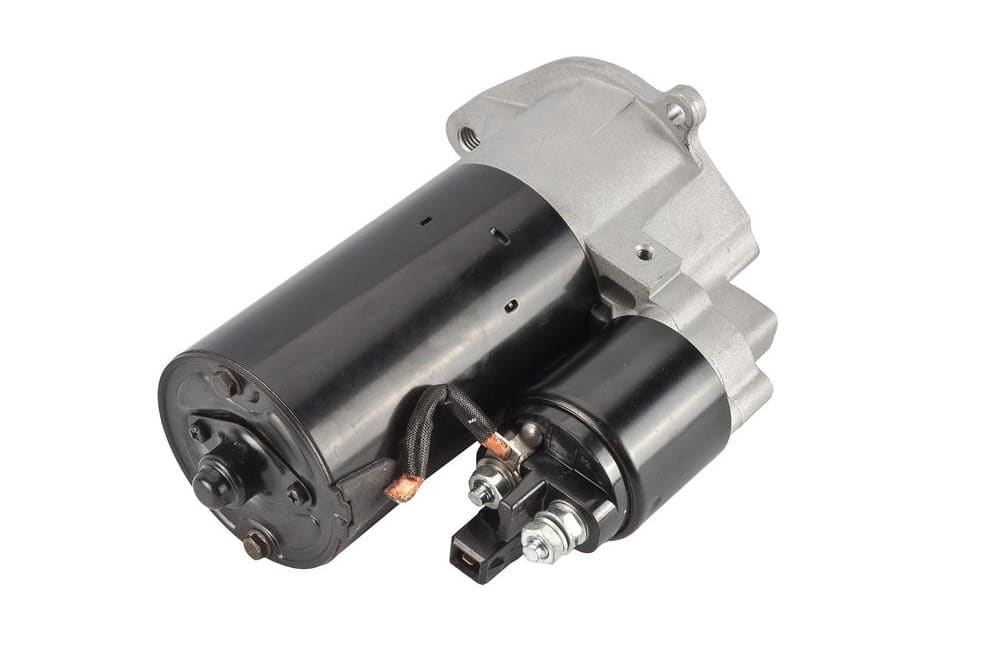

Every memorable drive you've experienced in your life begins with the successful operation of the starter on your vehicle. The starter on today's cars, trucks and SUVs is attached in the rear of the motor, where a gear on the starter aligns with the vehicle's flywheel to begin the ignition process. Once the engine turns over, fuel is introduced to the combustion chamber and is ignited by the activated ignition system. When this process works correctly, your engine comes to life. However, when the starter begins to wear out or break, it will impact your ability to drive the car.
Over time, the starter motor will eventually run its course and wear out. The two components inside the starter that commonly fail are the solenoid (which sends an electrical signal to the starter motor to activate) or the starter motor itself. When this occurs, the starter will be rendered useless and needs to be replaced by a certified mechanic. Although many of the internal components inside the starter can be fixed, it's recommended by most automotive manufacturers to replace the starter, so as to avoid future breakdowns.
Like any other mechanical device, when the starter fails or begins to wear out, it will display a few warning signs. Note the following 6 indicators of car starter problems:
1. The engine won't turn over and vehicle won’t start
The most common indicator of a problem with your starter is when you turn your key and nothing happens. You may hear no engine sound whatsoever or a loud clanking noise. This is often caused by the starter solenoid or motor that has burnt out or is experiencing an electrical issue. However, this problem may be caused by a dead battery as well. If this occurs, you'll have to contact a mechanic to inspect the starter, ignition system, and other electrical components, as it may be a sign of multiple issues.
2. Starter engages but doesn't spin the motor
There are times when you'll turn the ignition switch and hear the starter activate but will not hear the motor crank over. Issues with the starter are sometimes mechanical in nature. In this case, the problem may be due to the gears connected to the flywheel. Either the gear has stripped or become dislodged against the flywheel. In either case, the engine won't turn over and will require that you have the starter replaced by a certified mechanic.
3. Sporadic starting issues
Loose or dirty wiring within the starter system can cause the car to start or not start irregularly, and it can be hard to repair. It could also be caused by a damaged or failing electrical component. Even if starting problems only happen occassionally, you should get your starter inspected to avoid being unable to get home from an unfamiliar area.
4. Grinding noise when trying to start the motor
Similar to the issue above, this warning sign often occurs when the gears that connect the starter to the flywheel are worn out. However, grinding may also happen inside the starter motor. In either case, it's something that can't be fixed on the car. If this noise continues without the starter being replaced, it can cause damage to the engine's feel, which is a rather expensive repair to have completed.
5. Interior lights dim when starting the car
A short circuit in the the starter motor’s wiring may cause your dashboard lights to dim whenever you start the car. In this case, the starter motor pulls extra current away from the vehicle’s other systems. If a chugging sound accompanies the dimming lights, the bearings within the starter motor may be failing. Regardless, have your vehicle inspected as soon as possible.
6. Smell or see smoke when starting the motor
The starter is a mechanical system that is powered by electricity. Sometimes the starter will overheat because of continued power being supplied to the starter or the starter motor will not shut off after the car's engine has ignited. If this occurs, you'll most likely see or smell smoke coming from underneath the engine. This problem may be caused by a short circuit, blown fuse, or a problem with the ignition switch. In any case, it's important to contact a certified mechanic as soon as you notice this problem.
Problems with the starter are virtually impossible to avoid, as there really isn't a predetermined or recommended replacement by the automotive manufacturer. As soon as you notice freewheeling, grinding noises, smoke, or your vehicle not starting at all, contact a professional mechanic to further assist you in figuring out the problem.



